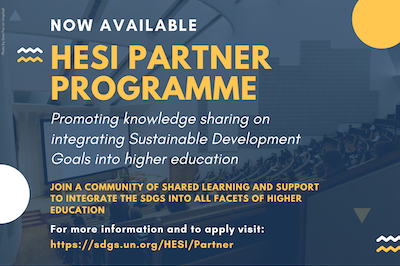Education
Description
Education for all has always been an integral part of the sustainable development agenda. The World Summit on Sustainable Development (WSSD) in 2002 adopted the Johannesburg Plan of Implementation (JPOI) which in its Section X, reaffirmed both the Millennium Development Goal 2 in achieving universal primary education by 2015 and the goal of the Dakar Framework for Action on Education for All to eliminate gender disparity in primary and secondary education by 2005 and at all levels of education by 2015. The JPOI addressed the need to integrate sustainable development into formal education at all levels, as well as through informal and non-formal education opportunities.
There is growing international recognition of Education for Sustainable Development (ESD) as an integral element of quality education and a key enabler for sustainable development. Both the Muscat Agreement adopted at the Global Education For All Meeting (GEM) in 2014 and the proposal for Sustainable Development Goals (SDGs) developed by the Open Working Group of the UN General Assembly on SDGs (OWG) include ESD in the proposed targets for the post- 2015 agenda. The proposed Sustainable Development Goal 4 reads "Ensure inclusive and equitable quality education and promote life-long learning opportunities for all" and includes a set of associated targets.
ESD is closely tied into the international discussions on sustainable development, which have grown in scale and importance since, Our Common Future appeared in 1987, providing the first widely-used definition of sustainable development as the "development that meets the needs of the present without compromising the ability of future generations to meet their own needs."
The crucial role of education in achieving sustainable development was also duly noted at the United Nations Conference on Environment and Development, held in Rio de Janeiro in 1992, through Chapter 36 of its outcome document - Agenda 21.
The importance of promoting education for sustainable development and integrating sustainable development actively into education was also emphasized in paragraph 233 of the Future We Want, the outcome of the United Nations Conference on Sustainable Development, Rio+20, in 2012.
In 2005, UNESCO launched the United Nations Decade of Education for Sustainable Development which reaffirmed the key role of education in shaping values that are supportive of sustainable development, and in consolidating sustainable societies. The final report of the UN Decade of Education for Sustainable Development, Shaping the Future We Want, was launched at the UNESCO World Conference on Education for Sustainable Development, held in November 2014, Nagoya, Japan.
In the run-up to the United Nations Conference on Sustainable Development, Rio+20, the Higher Education Sustainability Initiative (HESI) was created as a partnership of several sponsor UN entities (UNESCO, UN-DESA, UNEP, Global Compact, and UNU) aiming at galvanizing commitments from higher education institutions to teach and encourage research on sustainable development, greening campuses and support local sustainability efforts. With a membership of almost 300 universities worldwide, HESI accounts for more than one-third of all the voluntary commitments that came out of the Rio +20 Conference, providing higher education institutions with a unique interface between policy making and academia.

Higher Education Sustainability Initiative
The Higher Education Sustainability Initiative (HESI) provides higher education with an interface between higher education, science, and policy making by raising the profile of higher education’s sector in supporting sustainable development
Read more
HESI Partner Programme
Connecting higher education institutions, networks, and student organizations to create a community of shared learning in support of SDG integration
Read morePagination
| Title | Category | Date Sort ascending |
|---|---|---|
| Bangladesh | Health and population dynamics; Education and life-long learning | 5-May-2014 |
| Montenegro and Slovenia | Health and population dynamics; Education and life-long learning | 5-May-2014 |
| Sweden | Health and population dynamics; Education and life-long learning | 5-May-2014 |
| Austria | Health and population dynamics; Education and life-long learning | 5-May-2014 |
| China, Indonesia and Kazakhstan | Health and population dynamics; Education and life-long learning | 5-May-2014 |
| Brazil and Nicaragua | Debate on Gender equality and women’s empowerment, Education, Employment and decent work for all, Health and population dynamics | 2-Apr-2014 |
| Belarus | Debate on Gender equality and women’s empowerment, Education, Employment and decent work for all, Health and population dynamics | 2-Apr-2014 |
| Malta | Debate on Gender equality and women’s empowerment, Education, Employment and decent work for all, Health and population dynamics | 1-Apr-2014 |
| France, Germany and Switzerland | Debate on Gender equality and women’s empowerment, Education, Employment and decent work for all, Health and population dynamics | 1-Apr-2014 |
| Australia, The Netherlands and United Kingdom | Debate on Gender equality and women’s empowerment, Education, Employment and decent work for all, Health and population dynamics | 1-Apr-2014 |
| Peru and Mexico | Debate on Gender equality and women’s empowerment, Education, Employment and decent work for all, Health and population dynamics | 1-Apr-2014 |
| Jordan | Debate on Gender equality and women’s empowerment, Education, Employment and decent work for all, Health and population dynamics | 1-Apr-2014 |
| Bhutan, Thailand and Viet Nam | Debate on Gender equality and women’s empowerment, Education, Employment and decent work for all, Health and population dynamics | 1-Apr-2014 |
| Montenegro and Slovenia | Debate on Gender equality and women’s empowerment, Education, Employment and decent work for all, Health and population dynamics | 1-Apr-2014 |
| Italy, Spain and Turkey | Debate on Gender equality and women’s empowerment, Education, Employment and decent work for all, Health and population dynamics | 1-Apr-2014 |




